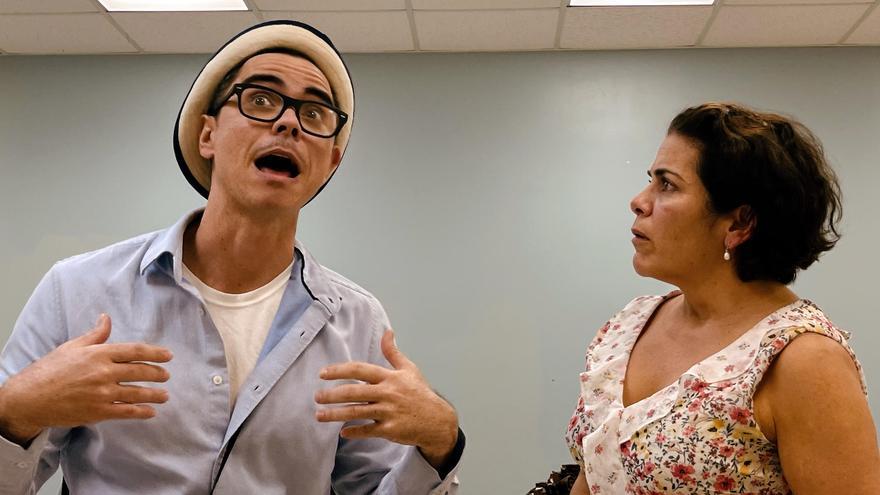
![]() EFE (via 14ymedio), Jorge I. Pérez, Miami, November 9, 2023 — The so-called 10 Million Ton Harvest of 1970, one of Fidel Castro’s first megaprojects, served as a historical backdrop for the Cuban-American playwright Nilo Cruz to write and direct Un parque en mi casa (A Park in my Home), whose Spanish premiere will be this Thursday in Miami with a “very simple and symbolic scenery”: a prop house.
EFE (via 14ymedio), Jorge I. Pérez, Miami, November 9, 2023 — The so-called 10 Million Ton Harvest of 1970, one of Fidel Castro’s first megaprojects, served as a historical backdrop for the Cuban-American playwright Nilo Cruz to write and direct Un parque en mi casa (A Park in my Home), whose Spanish premiere will be this Thursday in Miami with a “very simple and symbolic scenery”: a prop house.
Cruz, the first Hispanic to win the Pulitzer Prize for theater with Anna in the Tropics (2002), says in an interview with EFE that “writing about 1970, a year that changed my life, was a way to rescue a moment that I didn’t fully understand at the time.”
In Un parque en mi casa, according to the promotional notes for the new play, five relatives of an improvised Cuban family are waiting for the arrival of a Russian who will live with them as part of an international exchange program.
Each character, he adds, must fight with a life “full of changes and uncertainties, a divided country and an uncertain future, while working to meet the objectives of the ten million ton sugar harvest,” a production goal set by Castro in 1970 that ultimately was not achieved.
About the cast, the playwright points out that he has two veteran actors that he admires very much, Carlos Acosta Milián and Gretel Trujillo
Castro’s ambitious project, which mobilized almost the entire country, was not achieved but marked a spirit of possibility that Cruz has used from the point of view domestic intimacy.
“My father, a former political prisoner in several prisons in Cuba, including the Castle of San Severino and the Isle of Pines Prison, Puerto Boniato, was one of those victims forced to cut cane for the 10 Million Ton Harvest,” Cruz explains.
“In my house,” he explains, “we saw how he arrived despondent after doing his work in the cane fields. I remember that because of the brutal and extensive work he developed a chronic pain in his back.”
With four performances starting this Thursday in the Miami-Dade County Auditorium, Un parque en mi casa presents these characters “through a background of sadness and loss.”
They “carry in themselves a remarkable source of humor, healing and strength,” says the program notes of Arca Images, the company in charge of the editing and, according to its website, one of the main producers of bilingual Hispanic theater in South Florida.
I remember that due to the brutal and extensive work he developed a chronic pain in his back
About the cast, the playwright points out that he has two veteran actors that he admires very much, Carlos Acosta Milián and Gretel Trujillo.
Four actors who are working with him for the first time are also part of this production: Claudia Tomás, Daniel Romero, Guillermo Cabré and Ricky Saavedra.
Cruz, who in addition to the Pulitzer has received numerous awards, including those from the Kennedy Center Fund, the American Theatre Critics and the Humana Festival for New American Plays, wrote Un parque en mi casa, his original title, on a commission in 1995 by the McCarter Theater company, of Princeton, New Jersey.
“They invited me to participate in a festival of short plays based on the theme of the home. After having lived for many years in the United States, the subject made me travel through memory and write about my childhood in Cuba,” explains the playwright, who arrived in this country at the age of nine.
According to Cruz, the Russian who appears in the play “is a fictional character who functions as a detonator and at the same time a catalyst, who demystifies the revolutionary socialist romance of that time.” “He makes them all see a very different reality from what they imagined about the system,” he points out.
At the Miami showing, the public will see “a very simple scenery” that serves “to suggest an old house, underpinned by its poor condition. These wooden struts not only work to hold walls, but also as a symbol of sustaining the structure of a revolution that is crumbling.”
After having lived for many years in the United States, the subject made me travel through memory and write about my childhood in Cuba
According to Lillian Guerra’s Visions of Power in Cuba: Revolution, Redemption, and Resistance, 1959-1971, the 10 Million Ton Harvest between 1969 and 1970 was “the government’s attempt to revive popular euphoria through massive mobilizations to cut sugar cane and produce a record harvest to defeat underdevelopment.”
But the massive 1970 harvest did not reach ten million tons and damaged the island’s global economy, which was neglected.
“I think many will possibly identify with the loves, dreams and disenchantments of these characters, and the double life they undergo to survive,” Cruz predicts shortly before the premiere.
“The disillusionment, the disappointment continues to be repeated in all parts of the world, but we continue to attach ourselves to the arrogance of hope. The only thing we can’t lose is faith in the good and exercise that power within us and in all our actions,” he said.
Translated by Regina Anavy
____________
COLLABORATE WITH OUR WORK: The 14ymedio team is committed to practicing serious journalism that reflects Cuba’s reality in all its depth. Thank you for joining us on this long journey. We invite you to continue supporting us by becoming a member of 14ymedio now. Together we can continue transforming journalism in Cuba.
